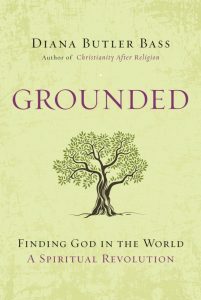 By Diana Butler Bass
By Diana Butler Bass
Reviewed by Betsy Johnson-Miller
HarperOne, 2015, 336 pp.
Where is God? Unpacking that question drives Diana Butler Bass’s notable new book. Butler Bass writes, “Not so long ago, believers confidently asserted that we occupied a three-tiered universe, with heaven above, where God lived; the world below, where we lived; and the underworld, where we feared we might go after death.” What mediated between those three spaces was the church, which acted as a “kind of holy elevator.” However, that view of the universe and our place in it no longer holds for many Christians. “The world, not heaven, is the sacred stage of our times,” Butler Bass writes. We now live “in a theologically flattened world.” Heaven is not above and hell is not below—they are right here, right now. God is no longer distant and, as a result, we have developed a theological intimacy with the world: “God can be found at the seashore, in a sunset, in the gardens we plant, at home, in the work we do, in the games we watch or play, in the stories that entertain us, in good food and good company, when we eat, drink, laugh, and even make love.”
A theology of transcendence and distance has been replaced by a theology that is more immanent and proximate. “What was once reserved for a few saints has now become the quest of millions around the planet—to be able to touch, feel, and know God for one’s self.” For Butler Bass, this translates into “divine nearness,” and “a quotidian God, whose holiness is revealed in worldly things, and toward divine simplicity, whose connections are woven through all that is.”
According to Pew Research Center data, about 23 percent of adult Americans are religious “nones”—people who identify themselves as atheists or agnostics, or who say that their religion is “nothing in particular.” For Butler Bass, it isn’t that people don’t believe anymore. “People believe, but they believe differently than they once did.” What does this look like? She states that the answer is simpler than most of us would guess. What people want is “to claim personal agency” in their lives. So we grow our own food, craft our own beer, make our own playlists. “In every arena we customize and personalize our lives,” Butler Bass states. Therefore, she concludes, “It makes perfect sense that we are making our spiritual lives as well, crafting a new theology. And that God is far more personal and close at hand.”
The book opens with the physical world, with chapters named “Dirt,” “Water,” and “Sky.” In the first chapter, Butler Bass talks about how, as a girl, she didn’t like the outdoors. On a Girl Scout retreat, she decided that “the earth was a threatening and inhospitable place” where she found critters in her sleeping bag and where she cried so hard that her troop leader called her mother to come and rescue her “from the hell of outdoors.” But then her family moved to the country, and after exploring this new world day after day with her brother and sister, she turned into “an adolescent girl accidentally embodying the spirit of Thoreau, finding heaven under my feet as much as over my head.”
 In “Water” she highlights not only the importance of water in religion (think the Ganges and the Jordan) but also discusses the water crisis that many are predicting in the not-too-distant future. She quotes researcher Jason Smerdon, who worries that, “the twenty-first century projections [of upcoming water shortages] make the [previous] megadroughts seem like quaint walks through the Garden of Eden.”
In “Water” she highlights not only the importance of water in religion (think the Ganges and the Jordan) but also discusses the water crisis that many are predicting in the not-too-distant future. She quotes researcher Jason Smerdon, who worries that, “the twenty-first century projections [of upcoming water shortages] make the [previous] megadroughts seem like quaint walks through the Garden of Eden.”
In the second half of the book, Butler Bass examines the geography of humans, with chapters on subjects such as “Roots,” “Home,” and “Neighborhood.” Throughout the book she interweaves personal narrative with subjects like Jewish theology, discussions on DNA and family systems, Pew Research Center data, and Supreme Court decisions. In the chapter “Sky,” for example, Butler Bass describes a family retreat in the Wind River Range in Wyoming, a couple of hours east of Yellowstone. The director warned everyone to bring flashlights and to take care after dark, since people who lived in cities were not used to what night was like without any electric lights. One night she forgot to grab a flashlight and, she writes, “when the sun completely set, it seemed like a thick wool blanket had been pulled over my head.” After a few minutes her eyes adjusted, and she began to tremble in the face of more stars than she had ever seen before. She writes:
Without a moment’s reflection, the words of an old hymn sounded in my mind: “Consider all the worlds thy hands have made.”
Consider. Indeed, the word “consider,” which comes from the French and literally means to “observe the stars,” now serves as a call to reflect upon or study intensely. Consider the sky. That night in Wyoming, I understood that the sky was much more than I knew. It was compelling and frightening. I considered not only my strange insignificance, but I considered God, the one who is Light and made the lights.
As I reflected on Butler Bass’ themes, I recalled my visit to a scrubby little tree called the Spirit Little Cedar by the Ojibwe, who consider it sacred. As I touched the rough bark and listened to the pounding waves of Lake Superior below it, I felt as if I was standing in a “thin place,” a place where, according to Celtic belief, the veil between this world and the other world grows gossamer. Standing there, I could feel myself opening to wonder and encountering the holy. With that experience in mind, much of Butler Bass’ book resonated with me.
Another part of me resisted her claims. I recalled my visit to the Church of Scientology in St. Paul. There I was promised the tools and methods for finding my own answers, my own truths about my life and me. We are narrative creatures, and many of us—myself included—are looking for a Good Story that will bring meaning to our lives. But the vision offered by the Church of Scientology—and to a lesser extent by Butler Bass—seemed too narrow. Religion should not begin and end with me. What is to prevent a faith like that from devolving into a greater concern with getting warm fuzzies for ourselves than with doing the hard work of loving our neighbors—inside and outside our communities of faith?
Butler Bass finishes her book with the idea that we are in the midst of a spiritual revolution and that “finding God in the world, is an invitation to new birth, most especially for religion.” As “the earth groans for salvation,” she writes, it is time for “the church to wake up. There is nothing worse than sleeping through a revolution.”
It is an impassioned plea, and one that the church would do well to heed. Experiencing God in all God has made is an important corrective to the false secular/sacred dichotomy. But reading the book, it was hard not to wonder which is more dangerous or disturbing—a distant God, or a customizable one?
Like this post? Subscribe to have new posts sent to you by email the same day they are posted.



Betsy, this is such a fine review! I’m headed to Amazon to purchase this book. Thank you, as always, for your clear vision and insightful writing.